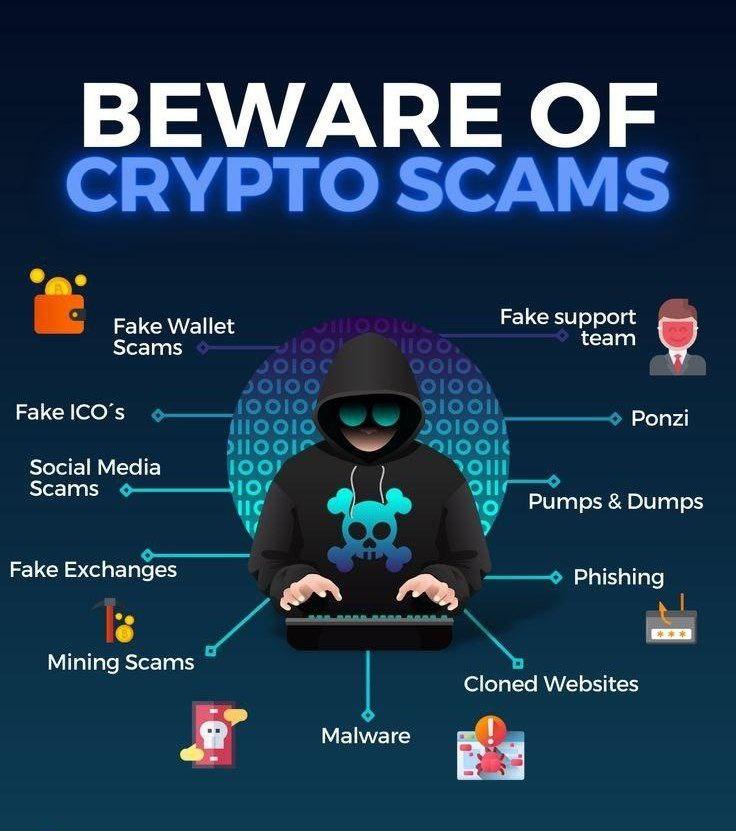Fake Wallet Scams:
Fake Wallet Scams are a type of fraud where scammers create fake crypto wallets with the intention of stealing users' personal cryptocurrency. Here is how it works and the precautions you can take:
How it works:
Fake Wallet Apps: Scammers create apps that look like legitimate wallet apps. When users download these apps and input their crypto wallet information, such as private keys or recovery phrases, scammers steal their cryptocurrency.
Fake Websites: Scammers create fake websites that imitate real crypto wallets or exchanges. If a user logs in to these sites, their private key or login credentials are stolen, granting scammers access to their cryptocurrency accounts.
Phishing Links: Sometimes, phishing links are sent through messages, emails, or social media, directing users to fake wallets or exchanges. If users input their information on these sites, it gets stolen.
Precautions:
Download from Official Websites or App Stores: Only download crypto wallet apps from official websites or reliable sources like Google Play Store or App Store.
Check the URL Carefully: Before using a wallet, verify the website's URL and ensure it’s the legitimate site.
Do Not Share Private Keys or Recovery Phrases: Never share your private keys or recovery phrases with anyone. Legitimate organizations or support teams will never ask for these.
Use Two-Factor Authentication (2FA): Enable two-factor authentication on your wallet or exchange account to enhance security.
Check Wallet Reviews and Ratings: Before using a new wallet, review its user ratings and feedback.
Avoid Phishing Links: Do not click on links from unknown emails, messages, or social media sources.
Following these preventive measures can help protect you from Fake Wallet Scams.
0/1
Fake Wallet Scams are a type of fraud where scammers create fake crypto wallets with the intention of stealing users' personal cryptocurrency. Here is how it works and the precautions you can take:
How it works:
Fake Wallet Apps: Scammers create apps that look like legitimate wallet apps. When users download these apps and input their crypto wallet information, such as private keys or recovery phrases, scammers steal their cryptocurrency.
Fake Websites: Scammers create fake websites that imitate real crypto wallets or exchanges. If a user logs in to these sites, their private key or login credentials are stolen, granting scammers access to their cryptocurrency accounts.
Phishing Links: Sometimes, phishing links are sent through messages, emails, or social media, directing users to fake wallets or exchanges. If users input their information on these sites, it gets stolen.
Precautions:
Download from Official Websites or App Stores: Only download crypto wallet apps from official websites or reliable sources like Google Play Store or App Store.
Check the URL Carefully: Before using a wallet, verify the website's URL and ensure it’s the legitimate site.
Do Not Share Private Keys or Recovery Phrases: Never share your private keys or recovery phrases with anyone. Legitimate organizations or support teams will never ask for these.
Use Two-Factor Authentication (2FA): Enable two-factor authentication on your wallet or exchange account to enhance security.
Check Wallet Reviews and Ratings: Before using a new wallet, review its user ratings and feedback.
Avoid Phishing Links: Do not click on links from unknown emails, messages, or social media sources.
Following these preventive measures can help protect you from Fake Wallet Scams.
0/1
03:40 PM - Oct 08, 2024 (UTC)
In response Crypto to his Publication
In response Crypto to his Publication
Fake Support Team scams are a type of fraud where scammers pose as legitimate support teams for crypto exchanges or wallets. Their goal is to steal users' personal and sensitive information, such as private keys, passwords, or login details. Here’s how this scam works and the precautions you can take:
How it works:
Fake Support Team Contact: Scammers contact users via email, social media, or phone, claiming there is an issue with their account. They use excuses like account recovery or security verification to gather personal information.
Fake Chat or Help Desk: Scammers create fake websites or platforms with chat systems that look like legitimate help desks. When users ask for assistance, scammers prompt them to share sensitive information.
Fake Support Pages on Social Media: Scammers create fake support pages on social media, pretending to represent popular crypto exchanges or wallets, and reach out to users to collect their information.
Precautions:
Contact Customer Support through Official Websites: Always use the official website to contact the support team. Avoid engaging with suspicious contacts or support claims made on social media.
Avoid Unexpected Emails or Messages: Be cautious of any unexpected messages or emails from companies asking for help or information. Real support teams rarely contact users out of the blue.
Never Share Private Keys or Passwords: Legitimate customer support teams will never ask for your private keys, passwords, or recovery phrases. Do not share these with anyone.
Use Verified Social Media Pages: Before contacting support on social media, ensure the page is verified and legitimate.
Be Aware of Phishing: Avoid clicking on suspicious links and always verify any links in emails or messages before engaging.
By following these preventive steps, you can stay safe from Fake Support Team scams.
0/2
How it works:
Fake Support Team Contact: Scammers contact users via email, social media, or phone, claiming there is an issue with their account. They use excuses like account recovery or security verification to gather personal information.
Fake Chat or Help Desk: Scammers create fake websites or platforms with chat systems that look like legitimate help desks. When users ask for assistance, scammers prompt them to share sensitive information.
Fake Support Pages on Social Media: Scammers create fake support pages on social media, pretending to represent popular crypto exchanges or wallets, and reach out to users to collect their information.
Precautions:
Contact Customer Support through Official Websites: Always use the official website to contact the support team. Avoid engaging with suspicious contacts or support claims made on social media.
Avoid Unexpected Emails or Messages: Be cautious of any unexpected messages or emails from companies asking for help or information. Real support teams rarely contact users out of the blue.
Never Share Private Keys or Passwords: Legitimate customer support teams will never ask for your private keys, passwords, or recovery phrases. Do not share these with anyone.
Use Verified Social Media Pages: Before contacting support on social media, ensure the page is verified and legitimate.
Be Aware of Phishing: Avoid clicking on suspicious links and always verify any links in emails or messages before engaging.
By following these preventive steps, you can stay safe from Fake Support Team scams.
0/2
03:45 PM - Oct 08, 2024 (UTC)
In response Crypto to his Publication
A Ponzi scheme is a type of investment scam where returns for earlier investors are paid using the money from new investors. This scheme is not based on any real profits or legitimate investments, but rather on the constant flow of new investors' funds to pay returns to earlier participants. It is an ongoing process that relies on continuously recruiting new investors.
How a Ponzi scheme works:
Promise of high returns: Participants are often lured with the promise of fast and high returns. These rates are usually unrealistic and not aligned with actual market conditions.
No real investment: There is typically no legitimate business or profitable activity behind the scheme. The money brought in by new investors is used to pay profits to the earlier ones.
Need for new investors: The scheme depends on attracting new investors. Once the flow of new investments stops or slows down, the scheme collapses, and most investors lose their money.
Secrecy and pressure: Scammers often push investors to make quick decisions and avoid questions or criticisms about the scheme.
Ways to protect yourself from Ponzi schemes:
Be wary of unrealistic returns: If an investment project promises unusually high or fast returns, it may be a Ponzi scheme. Always exercise caution when dealing with such offers.
Check for transparency: Verify if the investment project or company has a legitimate business model. Understand how they generate profits and where their income comes from.
Verify with regulatory authorities: Legitimate investment projects are usually registered with government or regulatory bodies. Fraudulent schemes often lack transparency or registration.
Do not expect guaranteed returns: Ponzi schemes often promise quick and certain profits, which is not realistic in genuine investments. Real investments come with risks, and profits are never guaranteed.
Talk to other investors: Speak with other participants in the project and verify their experiences. If there are any signs of fraud, take immediate action.
While Ponzi schemes may seem attractive at first, they ultimately result in significant financial losses. Stay cautious and conduct thorough research before investing.
0/3
How a Ponzi scheme works:
Promise of high returns: Participants are often lured with the promise of fast and high returns. These rates are usually unrealistic and not aligned with actual market conditions.
No real investment: There is typically no legitimate business or profitable activity behind the scheme. The money brought in by new investors is used to pay profits to the earlier ones.
Need for new investors: The scheme depends on attracting new investors. Once the flow of new investments stops or slows down, the scheme collapses, and most investors lose their money.
Secrecy and pressure: Scammers often push investors to make quick decisions and avoid questions or criticisms about the scheme.
Ways to protect yourself from Ponzi schemes:
Be wary of unrealistic returns: If an investment project promises unusually high or fast returns, it may be a Ponzi scheme. Always exercise caution when dealing with such offers.
Check for transparency: Verify if the investment project or company has a legitimate business model. Understand how they generate profits and where their income comes from.
Verify with regulatory authorities: Legitimate investment projects are usually registered with government or regulatory bodies. Fraudulent schemes often lack transparency or registration.
Do not expect guaranteed returns: Ponzi schemes often promise quick and certain profits, which is not realistic in genuine investments. Real investments come with risks, and profits are never guaranteed.
Talk to other investors: Speak with other participants in the project and verify their experiences. If there are any signs of fraud, take immediate action.
While Ponzi schemes may seem attractive at first, they ultimately result in significant financial losses. Stay cautious and conduct thorough research before investing.
0/3
03:53 PM - Oct 08, 2024 (UTC)
In response Crypto to his Publication
Help me bro: https://gamevault777apk.ne...

Download Game Vault 777 APK – Updated Version 2025
We have done comprehensive research on best game available on game vault 777 for gamers. You can enjoy these game with your family and friend
https://gamevault777apk.net/
05:46 PM - Feb 17, 2025 (UTC)

